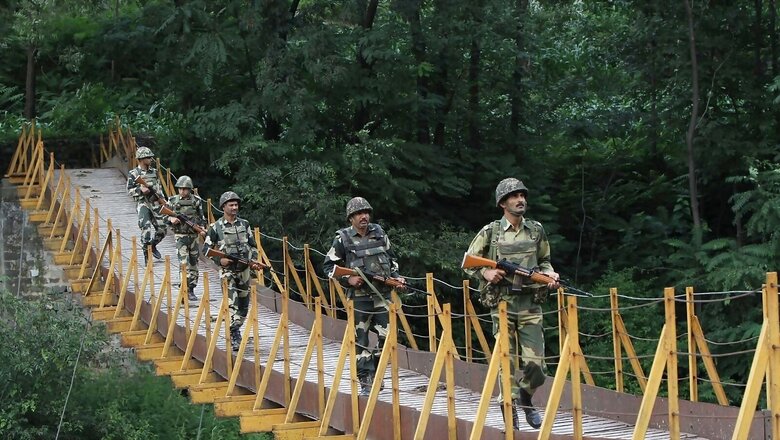
views
The Border Security Force (BSF) is at the core of the latest Centre vs states tussle after the Narendra Modi government augmented the powers of the force to allow officials to search, seize and arrest, at par with their police counterparts, 50 kilometres into Punjab, Bengal and Assam. Earlier, the jurisdictional limit for BSF in these states was 15 kilometres. The Ministry of Home Affairs said the decision was meant to “improve operational efficiency” and “crack down on smuggling rackets” but the move has irked the states, with Punjab calling it a “direct attack on federalism”.
Here’s all you need to know about the move and why it has triggered a row:
What has happened?
In a gazette notification, the ministry said it was amending an earlier notification of 2014 on jurisdiction of the BSF to exercise its powers in states where it guards the international border.
It outlined the new jurisdiction as “whole of the area comprised in the States of Manipur, Mizoram, Tripura, Nagaland and Meghalaya and Union Territories of Jammu and Kashmir and Ladakh and so much of the area comprised within a belt of fifty kilometers in the States of Gujarat, Rajasthan, Punjab, West Bengal and Assam, running along the borders of India”.
What did the rule say earlier?
The earlier notification of July 3, 2014, outlined the BSF’s jurisdiction as “whole of the area comprised in the States of Manipur, Mizoram, Tripura, Nagaland and Meghalaya and so much of the area comprised within a belt of eighty kilometers in the State of Gujarat, fifty kilometers in the State of Rajasthan and fifteen kilometers in the States of Punjab, West Bengal and Assam, running along the borders of India”.
A Union Home Ministry official said the changes were made under the Border Security Force Act of 1968, following suggestions from the BSF, and that the aim was also to keep the force’s operational jurisdiction uniform in these states.
Why are states objecting?
The move has not gone down well with Punjab and Bengal, with both calling it an attack on federalism. Punjab chief minister Charanjit Singh Channi has condemned the 35-km increase in Punjab, which is a border state, calling the decision of the ministry of home affairs (MHA) “irrational”.
He tweeted: “I strongly condemn the GoI’s unilateral decision to give additional powers to BSF within 50 KM belt running along the international borders, which is a direct attack on the federalism. I urge the Union Home Minister @AmitShah to immediately rollback this irrational decision.”
Channi had met home minister Amit Shah on October 5 urging him to “seal” the international border along Punjab to curb trafficking of drugs and weapons into the state from Pakistan. A week later, on October 11, MHA increased the BSF’s jurisdiction to search, seize and arrest deep inside the border state along with West Bengal and Assam.
West Bengal Transport Minister and TMC leader Firhad Hakim said: “The Central Government is violating the federal structure of the country. Law and order is a state subject but the Central Government is trying to interfere through central agencies.”
Congress MP Manish Tewari tweeted that the Centre’s decision “transgresses upon Constitutional public order & policing remit of States” and that “Half of Punjab will now fall under BSF jurisdiction”.
He pointed out that under the BSF Act, “Section 139 (ii) gives sweeping powers of arrest to BSF. It has powers of preventive arrest under Section 139 (1) & post offence arrest under 139 (ii). No mention of consultation with local police. Scheme of Act & its implementation regime needs to be studied.”
Assam, meanwhile, welcomed the extension, with Chief Minister Himanta Biswa Sarma saying: “In coordination with state police , this move will serve as a strong deterrent for defeating cross border smuggling & illegal infiltration. It strengths national security and national interest.”
Does BSF have anything to say?
Border Security Force (BSF) on Wednesday clarified that the step had been taken to “give uniformity to jurisdiction”.
The BSF said, “The amendment effected on October 11, 2021, establishes uniformity in defining the area within which Border Security Force can operate as per its charter of duties and execution of its role and task of border guarding in its areas of deployment.”
“This will also enable improved operational effectiveness in curbing trans-border crime and to an extent of 50 km from the international boundary within the states of Gujarat, Rajasthan, Punjab, West Bengal and Assam, running along the borders of India. Earlier, the limit was fixed to 80 km in case of Gujarat and 15 km in case of Rajasthan, Punjab, West Bengal and Assam,” BSF said in a press release.
Officials also told News18 that BSF did not have power to investigate and had to hand over suspect/accused to local authorities. They said an arrest by BSF would be applicable for limited crime as per the Code of Criminal Procedure. The BSF could not be involved in any criminal act other than cases related to the NDPS (Narcotic Drugs and Psychotropic Substances) Act, arms and ammunition.
Read all the Latest News , Breaking News and IPL 2022 Live Updates here.




















Comments
0 comment